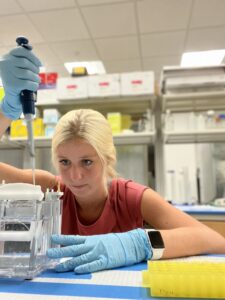 Exposure to radiation causes double-stranded breaks (DSBs) in human DNA, leading to many types of cancers. Humans are at risk of radiation exposure through medical examinations, treatments, nuclear accidents, and space travel. Thus, investigating the effects of radiation-induced DNA damage is important for finding new ways to protect humans from radiation-induced disorders. Last year, I investigated the effects of DSBs on B-Raf, an important signaling protein involved in cell growth and DNA repair pathways using human cancer cells as models. These cells were treated with doxorubicin, a radiomimetic drug (a compound that mimics radiation and creates DSBs in cells).
Exposure to radiation causes double-stranded breaks (DSBs) in human DNA, leading to many types of cancers. Humans are at risk of radiation exposure through medical examinations, treatments, nuclear accidents, and space travel. Thus, investigating the effects of radiation-induced DNA damage is important for finding new ways to protect humans from radiation-induced disorders. Last year, I investigated the effects of DSBs on B-Raf, an important signaling protein involved in cell growth and DNA repair pathways using human cancer cells as models. These cells were treated with doxorubicin, a radiomimetic drug (a compound that mimics radiation and creates DSBs in cells).
My results clearly show a concentration-dependent reduction specifically in the B-Raf protein levels. This decrease in B-Raf levels also correlates with the formation of DSBs in the treated cells. The mechanisms underlying this specific reduction of B-Raf levels due to doxorubicin treatment are unclear. During this scholarship, I intend to analyze the effects of doxorubicin treatment on Ras protein, which is essential for forming functional heterodimers with B-Raf. Additionally, I will also examine the effects of doxorubicin on the levels of B-Raf and Ras mRNA. My studies would shed new light on understanding the effects of DSBs due to radiation exposure, leading to new developments for protection against radiation exposure for astronauts and other space travelers. Additionally, these studies may further improve therapeutic applications of radiomimetic drugs, like doxorubicin, in the treatment of various cancers.

